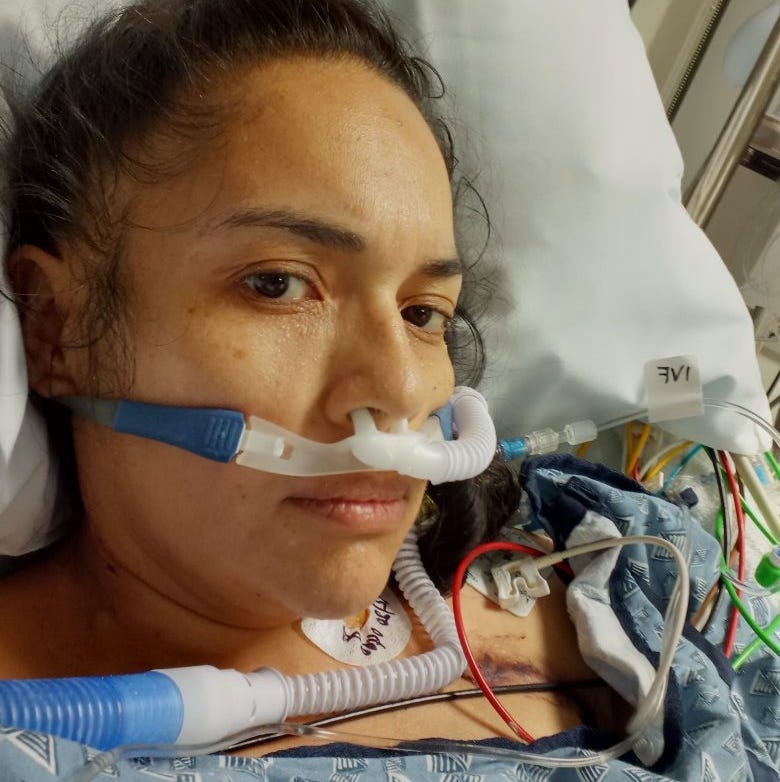
- Zuleyma Santos was diagnosed with peripartum cardiomyopathy 2 days after her daughter's birth.
- The condition enlarges and weakens the heart, limiting how much blood and oxygen it can pump out.
- Santos is waiting for a heart transplant, and speaking out to raise awareness of the condition.
Zuleyma Santos was breastfeeding her two-day-old in the hospital when she felt like she couldn't breathe. Up until then, everything had been fine.
"I was able to carry the pregnancy, I didn't have any symptoms, no swollen feet, I was able to sleep," Santos, who was 35 at the time, told Insider.
But her shortness of breath was quickly diagnosed as peripartum cardiomyopathy, or heart failure around the time of childbirth. Santos, who also has a 4-year-old and no family history of heart problems, had never heard of the term.
Now, about two and a half years, many hospitalizations, and two surgeries later, Santos is waiting for a heart transplant. She's sharing her story as volunteer for the American Heart Association's Go Red For Women campaign to raise awareness of the condition and to encourage women to look out for themselves.
"When we're pregnant, we go to the doctor and all they want to know is how the fetus is," Santos, who lives in LA, said. "They don't concentrate on us."
Santos felt healthy for months after her childbirth
Santos stayed in the hospital for a few days after her daughter's birth, and was released with medications for heart function and water retention, and instructions to keep up with her cardiologist.
After about four months, Santos felt so good she let her meds and appointments slide. "I thought to myself, 'I'm just going to keep living my life,'" she said, including returning to the retail job she loves. "I thought I was doing good, but as it turns out, obviously I wasn't."
By summer 2020, Santos was fighting nausea and fatigue, but convinced herself it was the valley's heat. By fall, she was in and out of the emergency room with swollen feet and exhaustion. Then in late October, her late husband, Christopher Valdez, called an ambulance because Santos couldn't breathe.
There, she was intubated with stage 4 heart failure. She woke up the next week to learn she'd undergone surgery to have a heart pump called an Impella implanted, and would need a transplant.

"I was in shock," Santos said. "All I thought about was: What is my mom going to do? What is my husband going to do? What are my kids going to do? I just couldn't believe that that was me."
"Because I did not take care of myself" by stopping her medications and doctor's visits, she added, "now I need a heart transplant."
Santos and her husband, who had cancer, alternated patient and caretaker roles
After two and a half months in the hospital, doctors replaced Santos's Impella with a left ventricular assist device (LVAD). An LVAD is considered a bridge to transplant, and runs on 10 pounds of cords and batteries Santos carries in a purse. "I try to make it look cute," she says.
Equipped with the device, Santos could return home to take over childcare responsibilites from Valdez, whose cancer had recurred. After helping Santos gain enough strength to lift their kids and drive, Valdez checked himself into the hospital. He died in March 2021.
"I didn't know that people went through that at our age," Santos said. You think about "heart failure and cancer when you're in your 60s, where your grown kids come see you," she added. "But that wasn't our case. "
In the upcoming months, Santos will undergo treatments to lower antibodies that could reject a foreign organ. Then she'll move from a status 4 to status 2 — top priority, along with status 1 — on the heart transplant waiting list.

But for now, she's focused on today. "I'm happy every day, I live in the moment, I live for my kids, for myself," Santos said. "I definitely think being happy, just being positive day to day, can make a big difference."
Peripartum cardiomyopathy limits blood flow from the heart
Peripartum cardiomyopathy, which can occur leading up to or in the months following childbirth, is uncommon, affecting between 1,000 and 1,300 women in the US each year, the American Heart Association says.
During PPCM, the heart chambers enlarge and the muscle expands, reducing how much blood — and therefore oxygen — the left ventricle can pump out through the body.
It's unclear what causes PPCM, but people with obesity, a history of heart disease, and smoking or alcohol misuse are among those at higher risk.
Most patients recover some or all of their heart function, according to the Cleveland Clinic, and treatments range from temporary medications to heart transplants. "Heart disease and stroke kills 1 in 3 women," Santos said. "I'm just glad that I'm here telling my story, and I wanna continue doing the same thing so that number can change in the future."

